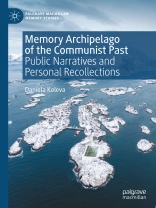This book looks at the memory of the communist past in Central and Eastern Europe, with a particular focus on Bulgaria: its “official” memory, constructed by institutions, its public memory, molded by media, rituals, books and films and the urban environment, and the everyday or ‘vernacular’ memory. It investigates how the recent past is remembered and the circumstances upon which this memory is conditioned – how is communism/socialism construed as a public recollection? Do these processes differ in the distinct post-communist countries? The book’s first part traces the institutional and political dimensions of coping with the communist past and the second part concentrates on personal reminiscences and vernacular memory. The book will be of interest for researchers and students in the fields of memory studies, Central and East European studies, oral history and contemporary history, as well as for specialists at institutions of memory and memory activists and organisations.
قائمة المحتويات
Introduction: Memory Archipelago.- Part One.- Politics of memory and cultures of memory.- Chapter 1. The new ‘grand narrative’: coping with the past.- Chapter 2. Politics of justice: the transitional justice.- Chapter 3. Politics of recognition.- Part Two.-.Narratives of memory and mnemonic communities.- Chapter 4. ‘Thorns in the spirit’: traumatic narratives.- Chapter 5. ‘Sorrow, almost hope’: nostalgic narratives.- Conclusion: Is there hope for memory?.
عن المؤلف
Daniela Koleva is
professor of Oral history and Memory studies at Sofia University working in the fields of oral history and anthropology of socialism and post-socialism, biographical and cultural memory, politics of memory and heritage. She has published a monograph on the ‘normal life course’ in communist Bulgaria and a number of edited volumes, book chapters and articles in peer-reviewed journals.












